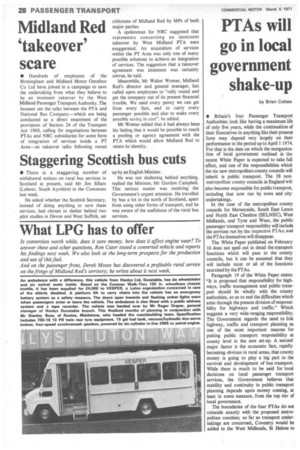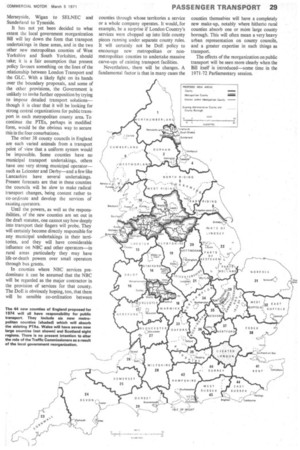PTAs will go in local government shake-up
Page 30

Page 31

If you've noticed an error in this article please click here to report it so we can fix it.
by Brian Cottee • Britain's four Passenger Transport Authorities look like having a maximum life of only five years, while the continuation of their Executives in anything like their present form may depend very largely on their performance in the period up to April 11974.
For that is the date on which the reorganization of local government outlined in the recent White Paper is expected to take full effect, and one of the responsibilities which the six new metropolitan county councils will inherit is public transport. The 38 nonmetropolitan county councils in England will also become responsible for public transport, including that now run by town and city undertakings.
In the case of the metropolitan county councils for Merseyside, South East Lanes and North East Cheshire (SELNEC), West Midlands, and Tyne and Wear, the public passenger transport responsiblity will include the services run by the respective PTAs; and the PTAs themselves will disappear.
The White Paper published on February 16 does not spell out in detail the transport functions which will pass to the county councils, but it can be assumed that they will include most or all of the functions exercised by the PTAs.
Paragraph 19 of the White Paper states: "It is proposed that responsibility for high ways, traffic management and public trans port should lie wholly with the county authorities, so as to end the difficulties which arise through the present division of responsi bility for highways and traffic." Which suggests a very wide-ranging responsibility.
The Government regards the need to link highway, traffic and transport planning as one of the most important reasons for putting public transport responsibility at county level in the new set-up. A second major factor is the economic fact, rapidly becoming obvious in rural areas, that county money is going to play a big part in the survival and development of bus transport.
While there is much to be said for local decisions on local passenger transport services, the Government believes that stability and continuity in public transport planning depends upon money coming, at least in some measure, from the top tier of local government.
The boundaries of the four PTAs do not coincide exactly with the proposed metro politan counties; so far as transport undertakings are concerned, Coventry would be added in the West Midlands, St Helens to Merseyside, Wigan to SELNEC and Sunderland to Tyneside.
It has not yet been decided to what extent the local government reorganization Bill will lay down the form that transport undertakings in these areas, and in the two other new metropolitan counties of West Yorkshire and South Yorkshire, should take; it is a fair assumption that present policy favours something on the lines of the relationship between London Transport and the GLC. With a likely fight on its hands over the boundary proposals, and some of the other provisions, the Government is unlikely to invite further opposition by trying to impose detailed transport solutions— though h is clear that it will be looking for strong central organizations for public transport in each metropolitan county area. To continue the PTEs, perhaps in modified form, would be the obvious way to secure this in the four conurbations. '
The other 38 county councils in England are such varied animals from a transport pOint of view that a uniform system would be impossible. Some counties have no municipal transport undertakings, others have one very strong municipal operator— such as Leicester and Derby—and a few like Lancashire have several undertakings. Present forecasts are that in these counties the councils will be slow to make radical transport changes, being content rather to co-ordinate and develop the services of existing operators.
Until the powers, as well as the responsibilities, of the new counties are set out in the draft statutes, one cannot say how deeply into transport their fingers will probe. They will certainly become directly responsible for any municipal undertakings in their territories, and they will have considerable influence on NBC and other operators—in rural areas particularly they may have life-or-death powers over small operators through bus grants.
In counties where NBC services predominate it can be assumed that the NBC will be regarded as the major contractor in the provision of services for that county. The DoE is obviously hoping, too, that there will be sensible co-ordination between counties through whose territories a service or a whole company operates. It would, for example, be a surprise if London Country's services were chopped up into little county pieces running under separate county rules. It will certainly not be DoE policy to encourage new metropolitan or nonmetropolitan counties to undertake massive carve-ups of existing transport facilities.
Nevertheless, there will be changes. A fundamental factor is that in many cases the counties themselves will have a completely new make-up, notably where hitherto rural counties absorb one or more large county borough. This will often mean a very heavy urban representation on county councils, and a greater expertise in such things as transport.
The effects of the reorganization on public transport will be seen more clearly when the Bill itself is introduced—some time in the 1971-72 Parliamentary session.




































































































